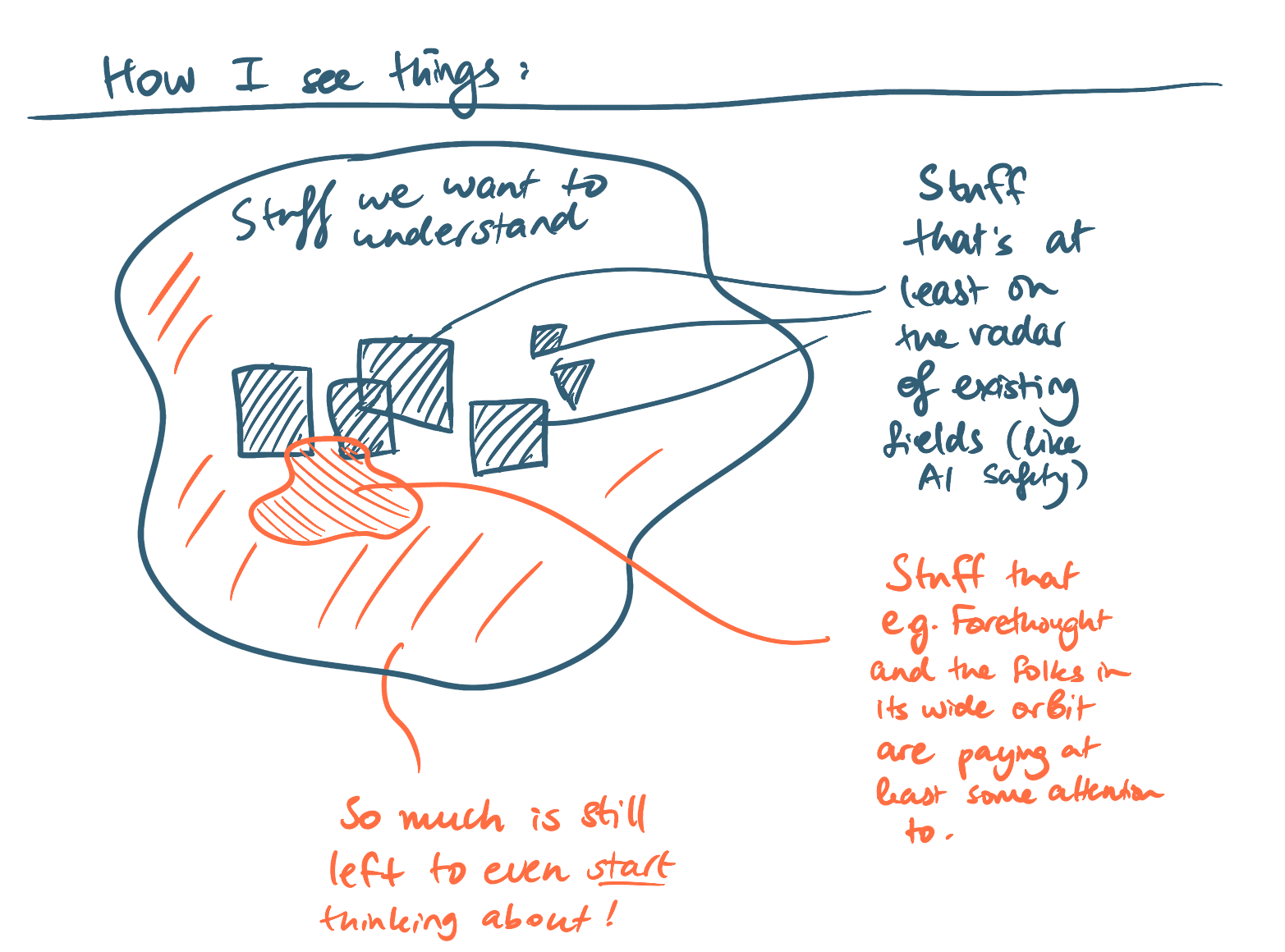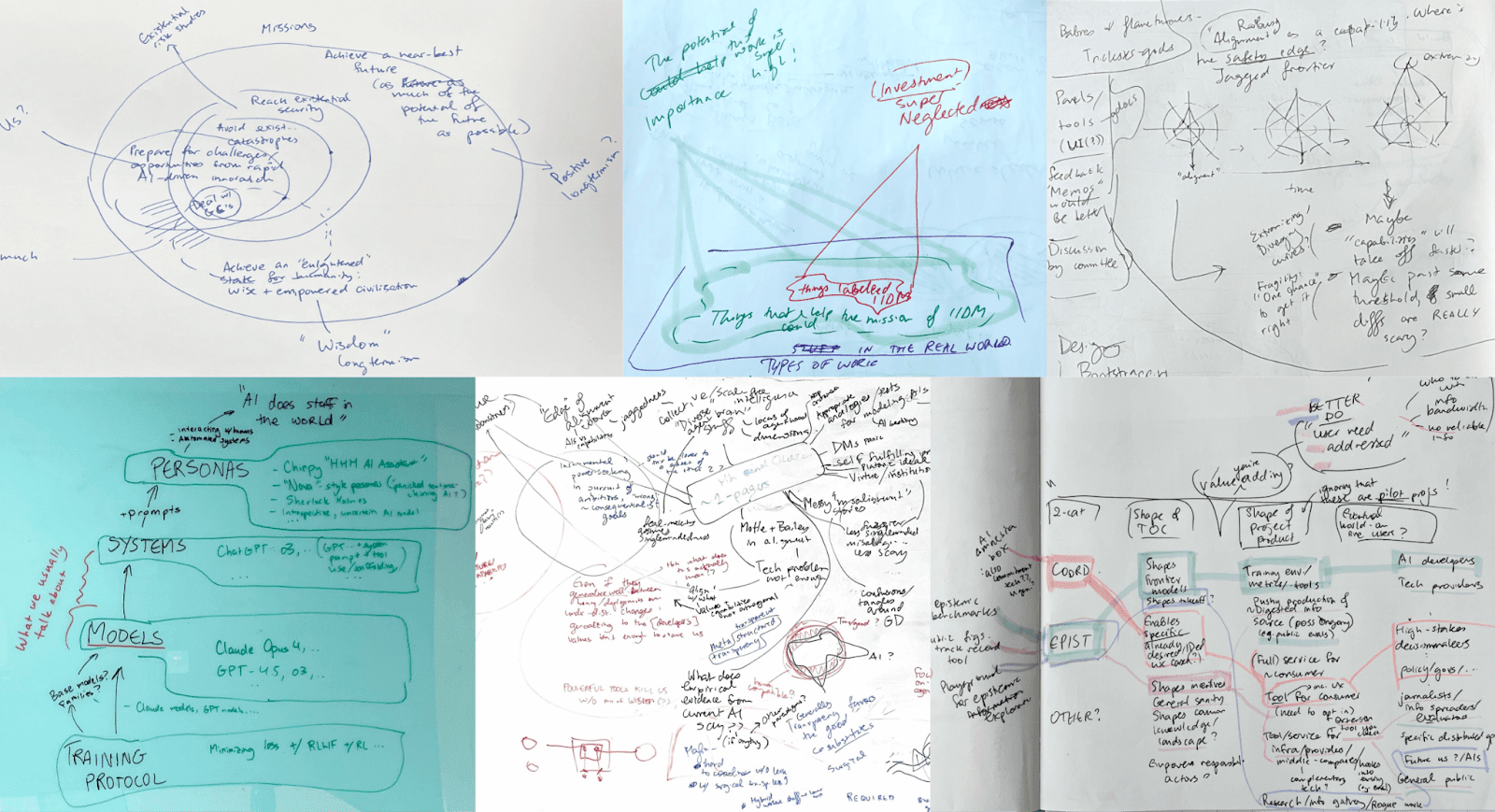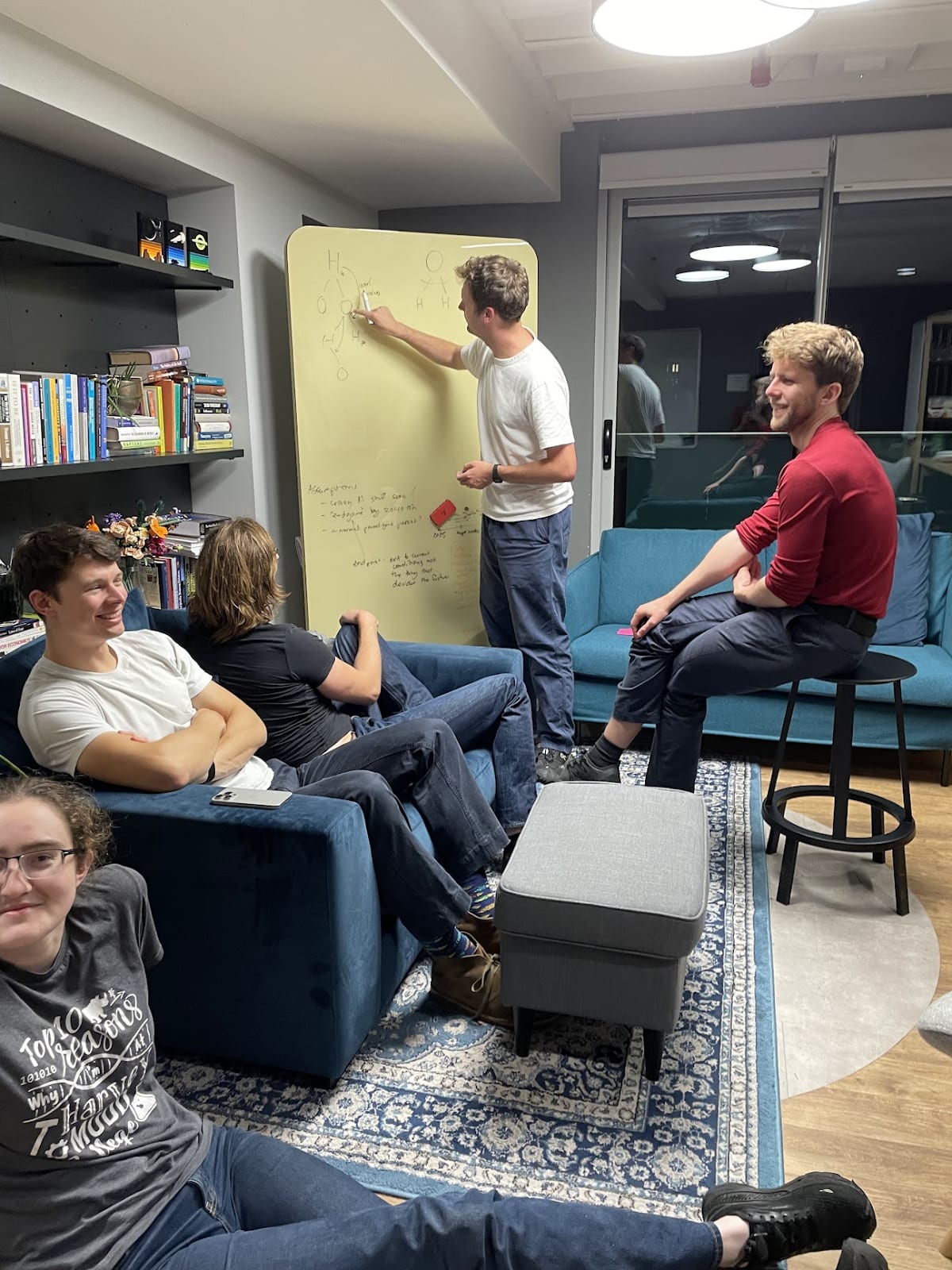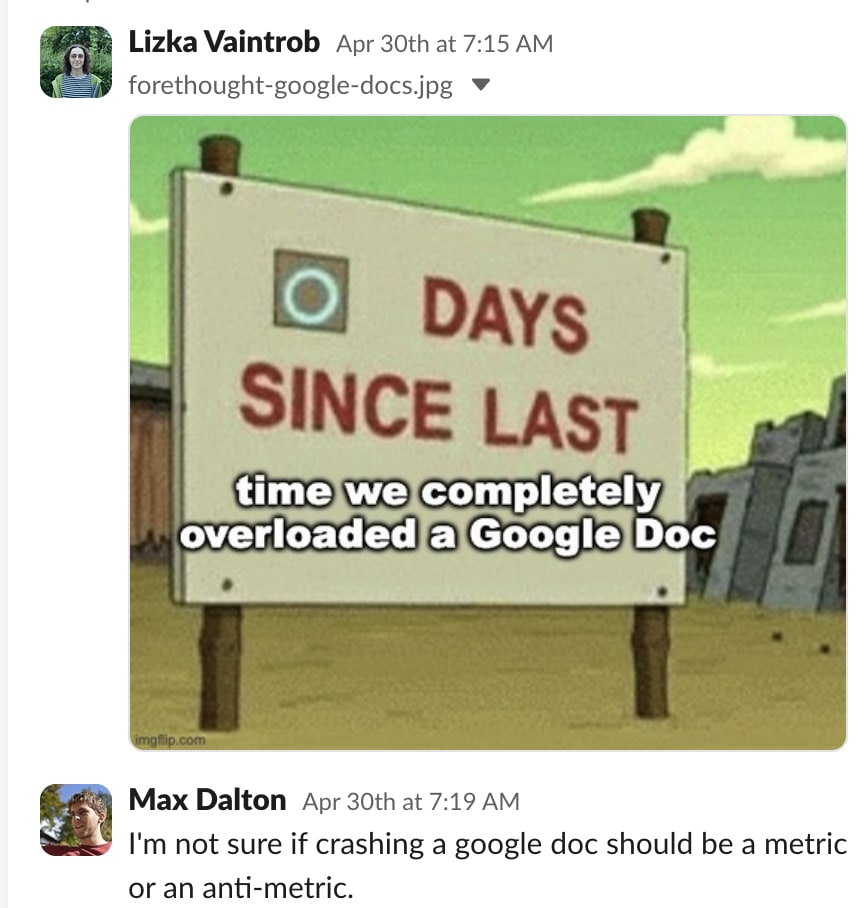Published on October 14, 2025 8:59 AM GMT
idenBasic facts:
- Forethought is hiring; apply for a research role by 1 November.The two open positions are for (i) “Senior Research Fellows” — people who can lead their own research directions, and (ii) “Research Fellows” — people who aren’t ready to lead an agenda yet, but who could work with others and develop their worldviews and research taste. Forethought is also open to hiring “visiting fellows” who would join for a 3-12-month stint.And you can refer people to get a bounty of up to £10,000.
In the rest of this post, I sketch out more of my personal take on this area, how Forethought fits in, and why you might or might not want to do this kind of work at Forethought.
Others at Forethought might disagree with various parts of what I say (and might fight me or add other info in the comments). Max reviewed a first draft and agreed that, at least at that point, I wasn’t misrepresenting the org, but that’s it for input from Forethought folks — I wrote this because I dislike posts written in an ~institutional voice and thought it could be helpful to show a more personal version of “what it’s like to work here.”[1]
A background worldview
Here’s roughly how I see our current situation:
- Increasingly advanced AI systems will be changing everything around us, very quicklyWe’re missing large chunks of the picture (the dynamics and challenges we can reason well about cover only a small fraction of the overall space)...and approaching this situation deliberately instead of flying blind could be incredibly important
Forethought’s mission is to help us “navigate the transition to a world with superintelligent AI systems.” The idea is to focus in particular on the questions/issues that get less attention from other people who think that advanced AI could be a big deal. So far this has involved publishing on topics like:
- AI-enabled coupsAiming for flourishing — not “mere” survivalDifferent types of intelligence explosionAI tools for existential securityPreparing for the Intelligence Explosion
(If you want to see more, here’s the full “research” page, although a lot of my favorite public stuff from my colleagues is scattered in other places,[2] e.g. the podcast Fin runs, posts like this one from Rose, Tom’s responses on LW & Twitter, or Will’s recent post on EA. And the same goes for my own content; there's more on the EA Forum/LW & Twitter.)
So in my view Forethought is helping to fill a very important gap in the space.[3] But Forethought is pretty tiny,[4] and collectively my sense is we’re nowhere near on track for understanding things to a degree that would make me happy. I think we don’t even have a bunch of the relevant questions/issues/dynamics on our radar at this point.

(Things that give me this sense include: often running into pretty fundamental but not well articulated disagreements with "state-of-the-art" research in this space or with others at Forethought, often feeling like everyone seems to be rolling with some assumption or perspective that doesn’t seem justified or feeling like some proposal rests on a mishmash of conceptual models that don’t actually fit together.)
So I would love to see more people get involved in this space, one way or another.[5] And for some of those people, I think Forethought could be one of the best places to make progress on these questions.[6]
Why do this kind of work at Forethought? (Why not?)
I joined (proto-)Forethought about a year ago. This section outlines my takes on why someone interested in this area might or might not want to join Forethought; if you want the “official” version, you should go to the main job listing, and there’s also some relevant stuff on the more generic “Careers” page.
Doing this kind of research alone — or without being surrounded by other people thinking seriously about related topics — seems really hard for most people. Being able to develop (butterfly) ideas in discussion with others, quickly get high-context feedback on your drafts or input on possible research directions,[7] and spend time with people you respect (from whom you can learn various skills[8]) helps a lot. It’s also valuable to have a space in which your thinking is protected from various distortion/distraction forces, like the pressure to signal allegiance to your in-group (or to distance yourself from perspectives that are “too weird”), the pull of timely, bikeshed-y topics[9] (or the urge to focus on topics that will get you lots of karma), the need to satisfy your stakeholders or to get funding or to immediately demonstrate measurable results, and so on. It’s also easier to stay motivated when surrounded by people who have context on your work.
And joining a team can create a critical mass around your area. Other people start visiting your org (and engaging with the ideas, sharing their own views or expertise, etc.). It’s easier for people to remember at all that this area exists. Etc.
I think the above is basically the point of Forethought-the-institution.
Many of the same properties have, I think, helped me develop as a researcher. For instance, I’ve learned a lot by collaborating with Owen, talking to people in Forethought’s orbit, and getting feedback in seminars. The standards of seriousness[10] set by the people around me have helped train me out of shallow or overly timid engagement with these ideas. And the mix of opportunity-to-upskill, having a large surface area / many opportunities to encounter a bunch of different people, and protection from various gravitational forces (and in particular the pull to build on top of AI strategy worldviews that I don’t fully buy or understand) has helped me form better and more independent models.[11]
(I also think Forethought could improve on various fronts here. See more on that a few paragraphs down.)
Working at Forethought has some other benefits:
- One important thing for me is having a good manager (and reasonable systems)
…particularly for prompting me to focus on what I endorse, troubleshooting blockers, providing forcing functions that help me turn messy thoughts and diagrams into reasonably presentable docs, and advice/help with things that feel almost silly, like getting to a better sleep schedule.[12]

Being managed by Max / working at Forethought also gives me a sense that I have a mandate[13] — feeling like someone expects me to help us better understand this stuff — which can make it easier for me to get around an impostory feeling that I’m not “the kind of person” who should be thinking about questions this thorny or stakes-y.
A final mundane-seeming advantage of working at Forethought that I nevertheless want to mention is that things just work; the operations side of things is really smooth and I basically don't have to think about it. There’s no bureaucracy to navigate, problems I flag just get fixed if they’re important, our infrastructure is set up sensibly from my POV, etc.(The job listing shares more info on stuff like salary, the office[14], the support you’d get on things like making sure what you write actually reaches relevant people or turns into “action”, etc.)
Still, Forethought is not the right place for everyone, and there are things I’d tell e.g. a friend to make sure they’re ok with before they decide to join. These might include:
- Spending some nontrivial attention & time on various asks from the rest of the Forethought team
- For instance, giving feedback on early drafts, weighing in on various org-wide strategic decisions, etc.Relatedly, if you think Forethought’s work is overall bad, then working here would probably be frustrating.
Forethought has a pretty wide scope, and project selection tends to be fairly independent, but it’s probably not the right place for totally blue-sky research.[15]
On my end, basically all the projects I work on at Forethought are things I chose to do without any “top-down” influence (but with input / feedback of various kinds from the team and others). This has changed somewhat over time; when I first joined, I spent more time working on project ideas suggested by others — which I think was a reasonably strong default (IIRC I also thought this was the right approach at that time, but these things reinforce each other and it feels sort of hard to untangle).Today I still feel like I’m naturally pulled somewhat more towards projects that I think others at Forethought would approve of (whether or not that’s true, and possibly entirely because my brain is following some social-approval gradients or the like), even when I’m not sure I wholly endorse that. I occasionally actively push against this pull, with e.g. Max’s help. (Overall I think total independence would be worse for me & my work, but do want to get better at paying attention to my independent taste and fuzzy intuitions.)And there are some other institutional “asks” Forethought makes of staff; we have weekly team meetings and seminars, we’ve sometimes had “themes” — periods of a few weeks or so where staff were encouraged to e.g. do more quick-publishing or connecting with external visitors,[16] etc.
People at Forethought disagree with each other a decent amount (and the vibe is that this is encouraged), regardless of seniority or similar — if that’d be stressful for you, then that’s probably a nontrivial factor to consider.[17]
OTOH we’re not on the extreme end of “nothing-held-back disagreeableness”, I think, so if you want that, it’s also probably not the right place.People are really quite into philosophy.I'll also list some things that I personally wish were different:
- The set of worldviews & perspectives represented on the team feels too narrow to me. (If I understand correctly, expanding this is one of the goals for this hiring round. Still, I’m maybe on the more extreme end, at Forethought, of wanting this to widen.)
I'd like us to get better at smoothly working on joint projects and giving each other feedback (e.g. at the right time, of the right kind).[18]
I personally think we are too frequently in a mentality on the “look for solvable problems and solve them” end of “macrostrategy”, where instead I think a mode more purely oriented towards “I’m confused, I want to better understand what the hell will happen or is happening here and how works” would often be better.I also have personally felt more bouts of unproductive perfectionism, or caught myself trying to do ResearchTM[19] in ways that have felt distracting. I think this was partly because others on the team had the same tendencies/pitfalls and those were somewhat getting reinforced for me, although some of this is probably better explained by something like “starting to do research (in a weird/new area) is generally hard”.
Who do I think would/wouldn’t be a good fit for this?
I’ve pasted in the official "fit" descriptions below (mostly because I don’t really trust people to just go read them on the job listing).
The main things I want to emphasize or add are:
- You really don’t have to have official credentials or any particular kind of background
- E.g. my background is pretty weird(And I'd be actively excited to have very different kinds of skill/experience profiles on the team)
Being able to notice and hold onto your confusion (without feeling totally paralyzed by it)[20]
Willingness to try on new conceptual models (or worldviews), improve them, ditch them if/when it turns out they’re not helpful or actively distracting — and stuff like distillation or being able to translate insights from one frame/worldview to anotherThe specific pairing of fairly high openness (being willing to entertain pretty weird ideas) and a healthy amount of skepticism / a strong research tasteSomething like “flexibility” — being willing to change your mind, switch projects, maybe dip between different levels of abstraction, consider earlier work from a variety of fields, etc.And as promised here’s the official description of the roles:
More basic info
The location, salary, benefits, etc, are included in the job listing (see also the careers page). If you have any questions, you could comment below and I’ll try to pull in relevant people (or they might just respond), or you might want to reach out directly.
There’s also the referral bonus; Forethought is offering a £10,000 referral bonus for “counterfactual recommendations for successful Senior Research Fellow hires” (or £5,000 for Research Fellows. Here’s the form.
In any case:
The application looks pretty short. Consider following the classic advice and just applying.
A final note
One last thing I want to say here — which you can take as a source of bias and/or as evidence about Forethought being a nice place (at least for people like me) — is that I just really enjoy spending time with the people I work with. I love the random social chats about stuff like early modern money-lending schemes[21] or cat-naming or the jaggedness of child language learning. People have been very supportive when personal life stuff got difficult for me, or when I’ve felt especially impostory. Some of my meetings happen during walks along a river, and at other times there’s home-made cake. And we have fun with whiteboards:
- ^
More specifics on the context here: Max asked me to help him draft a note about Forethought’s open roles for the EA Forum/LessWrong; I said it’d be idiosyncratic & would include critical stuff if I did that; he encouraged me to go for it and left some comments on the first partial draft (and confirmed what I was saying made sense); I wrote the next draft without input from Max or others at Forethought; made some edits after comments from Owen (hijacked some of our coworking time); and here we are.
- ^
I’ve mentioned that I think more of this (often more informal) content should go on our website (or at least the Substack); I think others at Forethought disagree with me, although we haven’t really invested in resolving this question.
- ^
(which is one of the main reasons I work here!)
- ^
Forethought has 9 people, of whom 6 are researchers. If I had to come up with some estimate of how many people overall (not just at FOrethought) are devoting a significant amount of attention to this kind of work, I might go with a number like 50. Of course, because so much of this work is interdisciplinary and preparadigmatic, there’s no shared language/context and I’m quite likely to be missing people (and per my own post, it’s pretty easy to get a skewed sense of how neglected some area is). (OTOH I also think the disjointedness of the field hurts our ability to collectively understand this space.)
Overall, I don’t feel reassured that the rest of the world “has it covered”. And at least in the broader community around EA / existential risk, I’m pretty confident that few people are devoting any real attention to this area.
- ^
While I’m at it: you might also be interested in applying for one of the open roles at ACS Research (topics listed are Gradual Disempowerment, AI/LLM psychology/sociology, agent foundations)
- ^
I wanted to quickly list some examples somewhere, and this seemed like a fine place to do that. So here are sketches of some threads that come to mind:
(I’m not trying to be exhaustive — basically just trying to quickly share a sample — and this is obviously filtered through my interests & taste [a])
-- How can we get our civilization to be in a good position by the time various critical choices are being made? Should we be working towards some kind of collective deliberation process, and what would that look like? Are there stable waypoint-worlds that we'd be excited to work towards? [Assorted references: paretotopia, long reflection stuff, various things on AI for epistemics & coordination, e.g. here]
-- What might ~distributed (or otherwise not-classical-agent-shaped) powerful AI systems look like? How does this map on to / interact with the rest of the threat/strategic landscape? (Or: which kinds of systems should we expect to see by default?) [See e.g. writing on hierarchical/scale-free agency]
-- Is it in fact the case that states will stop protecting their citizens’ interests as (or if) automation means they’re no longer “incentivized” to invest in a happy etc. labor force? (And what can/should we do if so?) [Related]
-- How should we plan for / think about worlds with digital minds that might deserve moral consideration? When might we need to make certain key decisions? Will we be able to find sources of signal about what is good for the relevant systems that we trust are connected to the thing that matters? (And also stuff like: what might this issue do to our political landscape?) [See e.g. this, this, and this]
-- How would AI-enabled coups actually play out? (What about things that look less like coups?) [ref]
-- Which specific “pre-ASI” technologies might be a big deal, in which worlds, how, ...?
-- More on how coordination tech (e.g. structured transparency stuff, credible commitments) could go really wrong, which technologies might be especially risky here, etc.
-- What might it look like for institutions/systems/entities that are vastly more powerful than us to actually interact with us in healthy (virtuous?) ways?
-- If AI systems get deeply integrated into the market etc., what would that actually look like, how would that play out? [E.g. more stuff like frictionless bargaining, or how things could go unevenly, or cascading risk stuff, perhaps.]
[a] If I try to channel others at Forethought, other things probably become more salient. E.g. how acausal trade stuff might matter, more on modeling dynamics related to automation or the intelligence explosion, exploring how we might in fact try to speed up good automation of moral philosophy, more on governance of space resources, more on safeguarding some core of liberal democracy, etc.
- ^
Sometimes there might be too many comments, I suppose:
- ^
One important dynamic here is picking up “tacit” skills, like underlying thinking/reasoning patterns. As a quick example, I’ve occasionally found myself copying a mental/collaborative move (often subconsciously) that I’d appreciated before.
- ^
Part of my model here is that my brain is often following the “easiest” salient paths, and that reasoning about stuff like radically new kinds of technology, what the situation might be like for animals in totally transformed worlds, what-the-hell-is-agency-and-do-we-care, etc. is hard. So if I don’t immerse myself in an environment in which those kinds of questions are default, my focus will slip away towards simpler or familiar topics.
- ^
Or maybe “realness”? (Tbh I’ll take any opportunity to link this post)
- ^
As an aside: I’d really like to see more people try to form their own ~worldviews, particularly trying to make them more coherent/holistic. Because the space is extremely raw and developing pretty quickly (so basically no one has the time or conceptual tools to fit all the parts together on their own), I think large chunks of the work here rest on the same shaky foundations, which I want to see tested / corrected / supported with others. I also think this is good for actually noticing the gaps.
- ^
- ^
a call to adventure ? (another post I love linking to)
- ^
which tbh might be underemphasized there; the opportunity to work in person from a nice office is a game-changer for some
- ^
In the past I’ve been overly concerned about what might not be in scope. Because hesitation around this felt distracting to me, I’ve got an agreement with Max right now that I’ll just focus on whatever seems important and he can flag things to me if he notices that I’m going too far out / account for this retrospectively. (So far I haven't hit that limit.)
- ^
(This was called “Explorethought”. There’s an abundance of puns at Forethought.; do with that information what you will.)
- ^
I like this aspect a lot, fwiw. (Especially since it doesn’t end up feeling that people are out to “win” arguments or put down others’ views.)
(Once in a while I get reminders of how weird Forethought’s culture can seem from the outside, e.g. when I remember that many (most?) people would hesitate to say they strongly disagree with a more senior researcher's doc. Meanwhile I’ve been leaving comments like “This breakdown feels pretty fake to me...” or “I think this whole proposal could only really work in some extreme/paradigmatic scenarios, and in those worlds it feels like other parts of the setup wouldn’t hold...”)
- ^
As one example, near the start of my tenure at Forethought, I ended up spending a while on a project that I now think was pretty misguided (an ITN BOTEC comparing this area of work with technical AI safety), I think partly because I hadn’t properly synced up with someone I was working with.
(Although the experience itself may have been useful for me, and it’s one of the things that fed into this post on pitfalls in ITN BOTECs.)
- ^
If interested see some notes on this here
- ^
Related themes here, IIRC: Fixation and denial (Meaningness)
- ^
Although I failed to explain it to some other people the other day, so I need some rescuing here
Discuss



